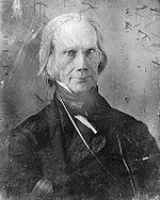
separately in both the Senate
and in the House of Representatives
. He served three different terms as Speaker of the United States House of Representatives
and was also Secretary of State
from 1825 to 1829.
Clay was a dominant figure in both the First
and Second Party
systems. As a leading war hawk
, he favored war with Britain and played a significant role in leading the nation to war
in 1812
. Later he was involved in the "Corrupt Bargain" of 1824, after which he was appointed Secretary of State by newly elected President John Quincy Adams. He was the foremost proponent of the American System
, fighting for an increase in tariffs to foster industry in the United States, the use of federal funding to build and maintain infrastructure, and a strong national bank.
If you wish to avoid foreign collision, you had better abandon the ocean.![]()
The gentleman cannot have forgotten his own sentiment, uttered even on the floor of this House, "Peaceably if we can, forcibly if we must."![]()
All religions united with government are more or less inimical to liberty. All, separated from government, are compatible with liberty.![]()
Government is a trust, and the officers of the government are trustees; and both the trust and the trustees are created for the benefit of the people.![]()
The arts of power and its minions are the same in all countries and in all ages. It marks its victim; denounces it; and excites the public odium and the public hatred, to conceal its own abuses and encroachments.![]()
Precedents deliberately established by wise men are entitled to great weight. They are evidence of truth, but only evidence...But a solitary precedent...which has never been reexamined, cannot be conclusive.![]()
I have heard something said about allegiance to the South. I know no South, no North, no East, no West, to which I owe any allegiance... The Union, sir, is my country.![]()
The Constitution of the United States was made not merely for the generation that then existed, but for posterity—unlimited, undefined, endless, perpetual posterity.![]()

